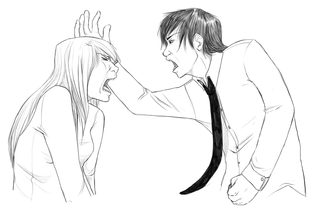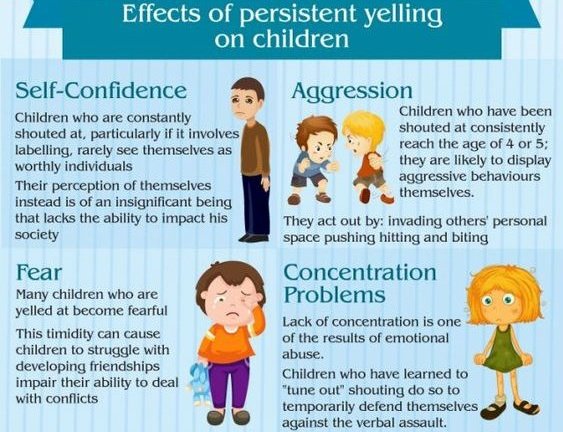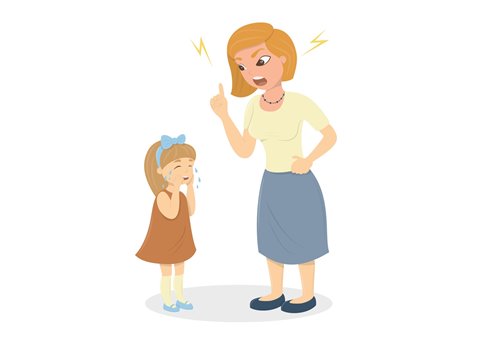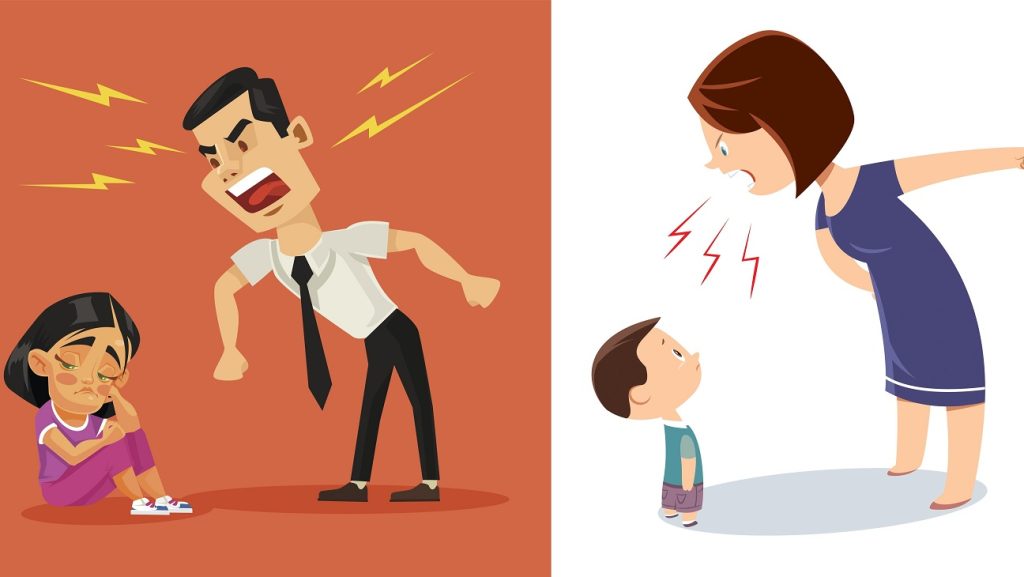When people are angry, their primal instinct is to yell to assert dominance and control over the situation. It’s a primitive way of trying to regain some semblance of power and composure. But what many people don’t realize is that yelling can have significant psychological effects on the person being yelled at (psychological effects of being yelled at). In this blog post, we will explore the concept of yelling, different types of yelling, the effects of being yelled at, and tips on how to deal with it.
Contents
Understanding Yelling

Generally, yelling is defined as raising one’s voice to an unusually high level to express anger or frustration. Furthermore, it can be verbal or emotional abuse and is often used as a way to intimidate or dominate someone.
What Qualifies As Yelling?
There is no single answer to this question as it may vary from person to person. For some, yelling may only occur when someone is screaming or using profanity. For others, it may be any time the person feels belittled or threatened by the other person’s anger.
Yelling And Unresolved Anger Issues
Some people may resort to yelling as a way to deal with their unresolved anger issues. This is often the case for people who have a history of being yelled at or abused. When someone is constantly exposed to yelling, they may start to feel that it’s normal and begin to yell themselves. However, this can be harmful to both the individual and the relationship.
Types of Yelling
There are three primary types of yelling:
Verbal Yelling: This type of yelling involves shouting and berating the other person with insults and threats.
Example: “You’re such an idiot! I can’t believe you did that! You’re going to be sorry!”
Emotional Yelling: This type of yelling is characterized by the person being emotional and irrational. They may cry, scream, or shout in an uncontrolled manner.
Example: “I can’t take it anymore! Why do you always have to do this? I’m so tired of being treated like this!”
Physical Yelling: This type of yelling is rare, but does occur occasionally. It involves the person raising their voice and becoming physically aggressive by pushing, hitting, or slapping the other person.
Example: “I’ll show you who’s boss around here! You don’t know who you’re dealing with!”
Silent Yelling: Silent yelling is a type of yelling that doesn’t involve any sound. It’s typified by the person giving the other person the “silent treatment” in an attempt to punish them or gain control over them.
Example: Not speaking to the other person for an extended period in an attempt to make them feel guilty or inferior.
Reasons Why People Resort To Yelling
There are several different reasons why people may yell. Some of the most common include:
Trying to gain control: Yelling can be used as a way to try and regain control over a situation that is spinning out of control.
Trying to assert dominance or control over the situation: Yelling can be a way to establish dominance or control over the other person.
Feeling insecure or inferior: People who feel insecure or inferior may resort to yelling as a way to try and make themselves feel better.
Communicating anger: Yelling is often an effective way for people to communicate their anger in a way that is clear and concise.
Power struggle: Yelling can be used as a tool in a power struggle to try and gain the upper hand.
Feeling threatened: When people feel threatened, they may resort to yelling to try and scare the other person away.
Using yelling as a way to punish the other person: Some people use yelling as a way to punish the other person for something they’ve done wrong.
Feeling overwhelmed or stressed: When people are feeling overwhelmed or stressed, they may resort to yelling as a way to release their anger and frustration.
Personality Types Who Yell Often
Several different personality types are more likely to resort to yelling. These include:
The aggressive type: Aggressive People often use yelling as a way to intimidate or control the other person.
The perfectionist type: Perfectionists often have high standards and expectations, which can lead to them yelling at others when they don’t meet these standards.
The control freak type: Control freaks often resort to yelling as a way to try and gain control over the other person or situation.
The emotional type: Emotional people are more likely to resort to yelling as a way to release their anger and frustration.
Parents Who Are Prone To Yelling Often
It’s not just adults who resort to yelling. Parents often yell at their children in an attempt to discipline them. Some parents may only resort to yelling occasionally, while others may do it more frequently. However, several factors can increase the likelihood of parents yelling at their children. These include:
Having a low tolerance for frustration: Parents who have a low tolerance for frustration are more likely to resort to yelling as a way to release their anger.
Lack of patience: Parents who lack patience are more likely to yell at their children, as they may feel that it’s the only way to get them to listen.
Having unrealistic expectations: Parents who have unrealistic expectations of their children are more likely to resort to yelling to try and get them to meet their expectations.
Poor anger management skills: Parents who don’t know how to manage their anger effectively are more likely to resort to yelling as a way to release their frustration.
NOTE: According to a study by the University of Pittsburgh, more than 80% of parents report yelling at their kids in the past year. And while yelling may seem like an effective way to get your child to listen, it can have negative consequences on their development.
Knowing the psychological effects of being yelled at
There are several different psychological effects that yelling can have on people. These include:
- Stress: Yelling can cause people to feel stressed out and overwhelmed.
- Anxiety: Yelling can cause people to feel anxious and scared.
- Depression: Yelling can lead to depression and feelings of sadness and hopelessness.
- Confusion: Yelling can cause people to feel confused and disoriented.
- Anger: Yelling often leads to feelings of anger and frustration.
- Low self-esteem: Yelling can damage people’s self-esteem and make them feel inferior and insecure.
- Humiliation: Yelling can lead to feelings of humiliation and embarrassment.
Negative Psychological Effects of Yelling On Children

When parents yell at their children, it can have several negative psychological effects on them, including:
Decreased self-esteem: Children who are constantly yelled at may start to feel like they are unworthy or inferior. This can lead to them having low self-esteem and feelings of self-hatred.
Decreased confidence: Children who are yelled at may start to feel uncertain and scared in social situations. This can lead to them having low confidence and a lack of self-belief.
Anxiety: Children who are constantly yelled at may start to feel anxious about interacting with others. They may also start to worry about things that never used to bother them before.
Depression: Children who are yelled at may start to feel depressed and hopeless about the future. They may also lose interest in activities that they once enjoyed.
Anger: Children who are constantly yelled at may start to feel a lot of anger and resentment towards their parents. This can lead to problems in their relationship with them in the future.
Eating disorders: Children who are yelled at may start to develop eating disorders as a way to cope with the stress and anxiety that they’re feeling.
NOTE: These are just some of the psychological effects that yelling can have on children. It’s important to remember that yelling is never an effective form of discipline, and can do more harm than good. Children who are constantly yelled at may start to feel distant from their parents and may lose respect for them.
Harmful Effects of Yelling
Yelling can have several harmful effects on relationships, both personal and professional.
In personal relationships
It can:
- Cause partners to feel resentful and angry towards each other.
- Damage the trust that exists between partners.
- Making it difficult for people to forgive and forget.
- Yelling can lead to fights and arguments.
In Marriage
The yelling spouse not only feels bad during the episode but also experiences a long-term negative effect on physical and psychological health.
A study in the “Journal of Family Psychology” found that wives who are regularly yelled at by their husbands are more likely to experience depression, anxiety, and alcohol abuse problems. They’re also more likely to suffer from chronic pain and poor physical health.
The study also found that men who are yelled at by their wives tend to suffer from psychological problems such as depression, anxiety, and anger control issues.
Furthermore, according to a study by the University of Rochester, couples who yell at each other are more likely to get divorced. Yelling can cause people to feel overwhelmed and stressed out, which is not good for a healthy relationship.
In professional relationships
It can:
- Cause people to feel resentful and angry towards each other.
- Damage the trust that exists between co-workers.
- Making it difficult for people to work together harmoniously.
- Yelling can lead to a breakdown in communication.
NOTE: According to a study by the University of Texas at Austin, yelling at employees is the number one cause of stress in the workplace.
Coping With Yelling
If you’re dealing with a yeller, there are a few things you can do to try and diffuse the situation:
Stay calm: It’s important to stay calm when someone is yelling, as it will only make the situation worse if you start to yell too.
Make eye contact: Making eye contact with the yeller can help to show that you’re listening and that you’re not afraid.
Repeat what’s been said: Repeating what’s been said can help to ensure that both parties are on the same page.
Don’t take it personally: Remember that the yeller is not targeting you specifically, they’re just releasing their anger and frustration in the wrong way.
Tips For Dealing With Negative Psychological Effects of Yelling
If you’ve been yelling at someone and you’re concerned about the negative psychological effects it may be having on them, there are a few things that you can do:
- Talk to the person about how you’re feeling. Let them know that you’re concerned about the way yelling is affecting them and that you want to help.
- Offer to help them find counseling or therapy. There are several therapies available that can help people deal with the psychological effects of yelling.
- If the person is a child, offer to help them find a therapist or counselor who specializes in working with children.
- Encourage the person to talk about how they’re feeling. Talking about emotions can help deal with them.
- Make sure that the person has time to relax and unwind. Make sure they have time to themselves, without any stress or pressure.
NOTE: If the person doesn’t want to talk about their feelings, don’t push them. Just be there for them and let them know that you support them.
If You’re a Yeller

If you find yourself yelling often, there are a few things that you can do to try and control it:
Get help: If you feel like you’ve been yelling too often or that it’s causing problems in your relationships, it may be helpful to seek out counseling or therapy.
Identify the triggers: Once you’ve identified what makes you yell, you can work on avoiding or dealing with those triggers. Don’t respond or retaliate with yelling. This will only further escalate the situation.
Take a step back: If you feel yourself getting angry, take a step back and try to cool down before reacting. Maybe, take a few deep breaths to calm yourself down.
Healthily express your anger: Instead of yelling, if possible, walk away from the situation to cool off. Or try to express your anger in a healthy way, such as through exercise or writing.
NOTE: Try to stay calm and collected. Don’t let the urge of yelling take over you in any case. And if these tips don’t seem to help, talk to a professional about your yelling problem. They may be able to give you some helpful tips on how to deal with it.
Talking To a Professional
If you’re experiencing negative psychological effects as a result of being yelled at, talking to a professional may be the best option for you. Several professionals can help with the psychological effects of being yelled at. It includes counselors, therapists, and psychologists. They will be able to provide you with support and guidance as you work through your problem. Furthermore, these professionals can also help you with your yelling issues if you are prone to yelling at others.
Therapies for Yelling
If you’re struggling with yelling, there are a few therapies that may be able to help:
Cognitive-behavioral therapy (CBT): CBT is a type of therapy that helps you change the way you think and behave. It can help you learn how to deal with difficult situations without yelling.
Dialectical behavior therapy (DBT): DBT is a type of therapy that helps you manage your emotions. It can help you learn how to control your anger and react calmly in difficult situations.
Psychodynamic therapy: Psychodynamic therapy is a type of therapy that explores your past experiences. And how they may be affecting your current behavior. It can help you understand why you’re yelling and find ways to deal with it.
Family therapy: Family therapy is a type of therapy that helps you address the problems that exist within your family unit. It can help you learn how to deal with yelling and other difficult behaviors.
Behavioral activation: Behavioral activation is a type of therapy that helps you get out. And do things that make you happy. It can help you reduce stress and anger, and it can also help you stop yelling.
Mindfulness meditation: Mindfulness meditation is a type of meditation that helps you focus on the present moment. It can help you learn how to stay calm and in control during difficult situations.
Support groups: Support groups are a great way to connect with other people who are struggling with the same issues that you are. They can offer support, advice, and friendship.
Group therapy: Group therapy is a type of therapy that involves a group of people who are all dealing with the same problem. It can help you learn how to deal with your yelling. And find support from others who understand what you’re going through.
Experts’ Views on Yelling
There is a lot of debate surrounding yelling and its effects on people. However, some experts believe that it can be harmful. While others believe that it can be helpful in some cases. Here are a few experts’ views on yelling:
“Yelling is an ineffective way to discipline your child and can lead to more behavioral problems. It can also have negative psychological effects on your child, such as anxiety, depression, and low self-esteem.” – Dr. Laura Markham
“If done constructively, yelling can be a very effective way to get someone’s attention and change their behavior.” – Dr. John Gottman
“Yelling is not only ineffective, but it’s also potentially harmful to the relationship between parents and children.” – Robin Goldstein
Brain Activity When You’re Being Yelled At

When you’re being yelled at, your brain goes into a state of stress. This is because your body is releasing cortisol, which is a hormone that helps you deal with stress.
Here are some of the things that happen in the brain when you’re being yelled at:
- The amygdala – the part of the brain responsible for fear and anxiety – becomes activated.
- The hippocampus – the part of the brain responsible for memory – becomes inactive.
- The frontal cortex – the part of the brain responsible for decision-making and problem-solving – becomes inactive.
Case Study
To show psychological effects of being yelled at:
In this case study, a mother is yelling at her son because he won’t clean his room. The son is visibly upset and is trying to ignore his mother.
The son’s brain is releasing cortisol, which is causing him to feel stressed and anxious. His amygdala is becoming activated, and his hippocampus is becoming inactive. This means that he isn’t able to remember anything that’s happening at the moment. Consequently, he isn’t able to make good decisions.
Conclusion
The bottom line is that yelling is never a good solution and can have negative consequences on both the individual and the relationship. It can also lead to behavioral problems. It can also lead to behavioral problems. If you’re dealing with a yeller, try to stay calm and diffuse the situation.
And if you’re a yeller, seek out help to identify and address the underlying issues. If you’re struggling with yelling, it’s important to seek help from a therapist or support group. Many different types of therapy can help you manage your emotions (psychological effects of being yelled at) and deal with your yelling.
A Word From Therapy Mantra
Your mental health — Your psychological, emotional, and social well-being — has an impact on every aspect of your life. Positive mental health essentially allows you to effectively deal with life’s everyday challenges.
At TherapyMantra, we have a team of therapists who provide affordable online therapy to assist you with issues such as depression, anxiety, stress, workplace Issues, addiction, relationship, OCD, LGBTQ, and PTSD. You can book a free therapy or download our free Android or iOS app.


